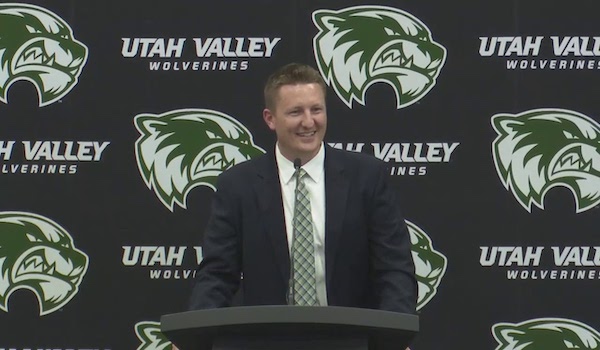After four seasons as an Assistant Coach at Utah Valley University, Dan Nielson left the program for an assistant coaching position at BYU in 2013, but he always kept an eye on the Wolverine program. Following six seasons and four NCAA Tournament berths at BYU, he returned to Orem in May of 2019 as the Head Coach of the Utah Valley program.
Can you take us through the interview process and your emotion once you received the call that you would be new Head Coach at Utah Valley?
The interview process went pretty quickly actually. I heard that the job was opening and as someone who was an Assistant Coach at UVU previously, I always knew I would be interested if the job opened up because I felt like it had endless potential being the largest school in Utah. I quickly reached out and sent my resume over hoping I would get the chance to interview.
When I did interview, I met with a large committee comprised of several people from all over campus, which was interesting because they brought very different perspectives than what you would hear from those just inside the athletics department. I was very glad I already knew a lot about the school and its goals outside of just athletics. After that I was asked to meet with the President a couple days later. We had a great conversation about the program and where I saw it going. About 45 minutes after we met, I was offered the job.
For me, it was a rush of several emotions. I was thrilled that I had accomplished a goal of becoming a Head Coach. I was grateful to everyone who helped me reach that goal. I was stressed over all the things that needed to get done in a very short amount of time with the team and recruiting. Most of all, I was excited about the challenge and new relationships that I would get to develop.
What approaches have you implemented or ways you have been creative in managing a small budget?
In regards to managing our budget, I have taken a sort of two-pronged approach. One is that I am always looking for ways to raise money and have been pretty successful so far. The second is that I always look for the best bang for my buck. We try to hit tournaments with multiple realistic prospects for us. We avoid “trading places” out recruiting. It requires more trust in my staff, but it saves a ton of money.
In scheduling, we look for a couple guarantee games where we could possibly get a second game in the area. Kind of a “two for one” where we can pay for the trip and still save some money.
What has been your strategy to scheduling non-conference games having taken over a program that has had marginal success prior to your arrival?
My approach in scheduling has had to change drastically from my previous job as Associate Head Coach at BYU. At BYU, it was all about scheduling for RPI. Here at UVU, I have to blend scheduling games that are good matchups, games that push us to get better, and guarantee games. My biggest goal is to have our team prepared for the WAC schedule. I feel like mixing up the schedule with games that we could win and build confidence with games that will stretch us and push us to improve is the best way to do that.
After your first few months as a first-time DI Head Coach, what advice do you have for Division I assistant coaches who desire to become a DI Head Coach?
The couple pieces of advice I would give to assistant coaches trying to make the jump to Head Coach is to keep building up your network. You never know what relationship will help you down the line. Be sincere in those relationships. Look for ways that you can help those people and not just what they can do for you.
The other advice I have is to lift where you stand. What I mean by that is wherever you are working this year, you should work like crazy to make it the best possible program. Don’t look ahead to the next job all the time and instead show that you can make a program better from your contributions year in and year out until that next opportunity presents itself.

